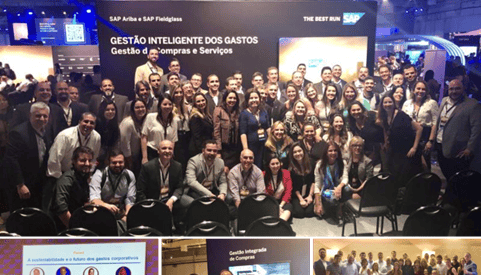Leveraging your company's presence at large-scale events.
Participating in large-scale events can be one of the most effective strategies for strengthening a company's presence in the market, expanding its network of contacts and consolidating its position as a leader in its sector.
MARKETING


Participating in large-scale events can be one of the most effective strategies for strengthening a company's presence in the market, expanding its network of contacts and consolidating its position as a leader in its sector.
However, for an event to have a truly significant impact, it takes more than just showing up. It requires a strategic, planned approach that maximizes opportunities and brand visibility. Below, we discuss how to leverage your company’s presence at a major event and the key points to consider to ensure success.
1. Define a Clear Objective for Participation
The first step to ensuring success at any major event is to clearly define your objectives. Do you want to increase brand awareness? Generate new leads from potential customers? Strengthen relationships with existing partners? Or perhaps introduce a new solution or product? Having a clear objective will help shape your entire strategy, from pre-event communication to interaction during the event and follow-up actions.
2. Take Advantage of Networking and Collaboration Opportunities
Large-scale events bring together influential professionals from different sectors, offering a unique opportunity to expand your network of contacts.
To leverage this opportunity, it is essential to not only attend the sessions and lectures, but also to actively engage in interactions with other participants.
Scheduling strategic meetings, such as meetings with executives, potential partners or customers, can be an effective way to maximize presence and generate new business opportunities.
Additionally, collaborating with other participants in panels, workshops, or discussions can position your company as a thought leader, increasing your credibility in the industry. The key here is to be proactive and seek out quality interactions, not just quantity.
3. Create an Immersive Experience for Attendees
Simply presenting your product or service at an event is no longer enough.
To truly stand out at a large-scale event, a company must create an immersive and engaging experience for attendees. This could include interactive booths, live demos, customer success stories, or hands-on workshops.
If your event is virtual, consider investing in technologies that provide an interactive experience, such as dynamic webinars or live chat rooms.
Furthermore, it is essential to ensure that the experience is aligned with the brand’s values and objectives, providing a memorable impression that goes beyond simply displaying products.
4. Use Digital Marketing to Boost Visibility
Today, digital marketing plays a key role in leveraging a company’s presence at large-scale events. From pre-event social media campaigns to creating live content during the event, digital strategies can amplify the reach of your participation.
Sharing real-time updates like photos, videos, and insights can attract additional attention and engage a wider audience who may not be physically present.
Additionally, using specific hashtags and other social media tools can generate conversations about your brand, increasing visibility organically.
5. Plan an Effective Post-Event Follow-Up
The work doesn’t end when the event ends. A well-planned follow-up is essential to consolidate the relationships built during the event and ensure that the opportunities generated are taken advantage of.
Sending personalized emails, scheduling follow-up calls, or even inviting contacts to product demo sessions are effective ways to maintain interest and move the business relationship to the next stage.
Conclusion: Key Points for Success
In short, leveraging a company’s presence at a large-scale event requires a strategic approach that goes beyond simple participation. To be successful, it is essential to:
Define clear objectives for the event, aligning them with the company's overall strategy.
Take advantage of networking and collaboration opportunities to expand your network and strengthen relationships.
Create immersive experiences that engage attendees and highlight your brand in a memorable way.
Use digital marketing to amplify visibility and engage a wider audience, both before and during the event.
Plan effective follow-up to ensure that the opportunities generated during the event are converted into concrete results.
By adopting these practices, a company can maximize the benefits of its participation in large-scale events and position itself as a leader in its industry. Success depends on careful planning, execution of a well-defined strategy, and an ongoing commitment to customer and partner relationships.
See more articles
Featured Articles
Continue reading about B2B marketing


